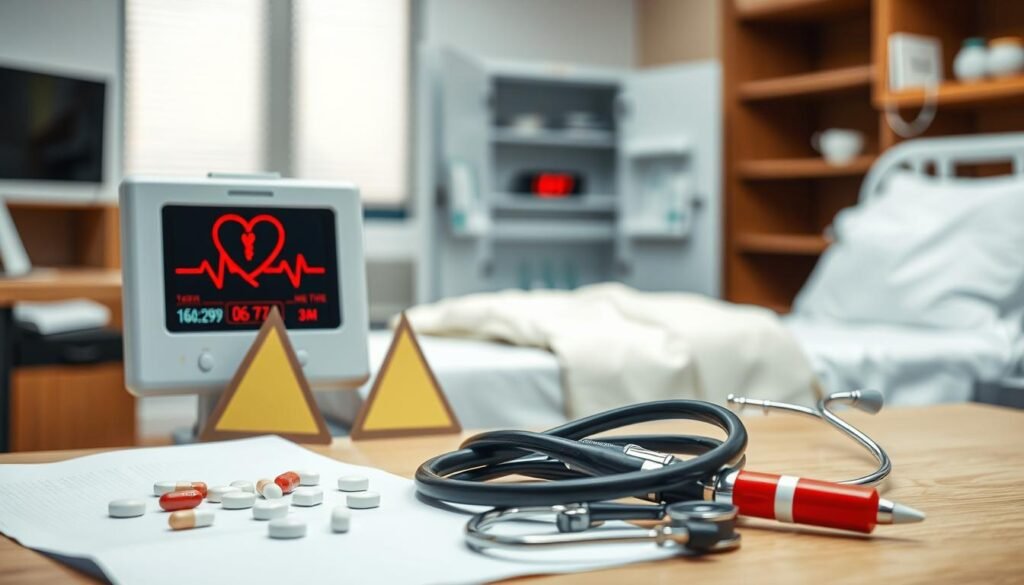Did you know losing over 5% of your body weight in six months without trying can signal serious health problems? This fact highlights the importance of spotting signs that need medical attention. Many people ignore their body’s warning signals, but overlooking serious symptoms can have serious outcomes. The Centers for Disease Control and Prevention (CDC) stress that seeing a doctor on time can greatly improve your health. It’s crucial to listen to your instincts when you feel something’s not right.
It’s vital to know when to seek medical help. Understanding which symptoms are okay to handle at home and which need a doctor’s care can make a big difference. By recognizing common warning signs and listening to your body, you can get the help you need quickly.
Key Takeaways
- Recognizing unexplained weight loss is crucial for early diagnosis.
- Persistent fevers lasting over a few days may indicate serious conditions.
- Understanding changes in bowel movements can highlight gastrointestinal issues.
- Emergency symptoms like severe pain should prompt immediate medical evaluation.
- Timely consultations can lead to better health outcomes.
- Trusting one’s instincts when feeling unwell is vital for maintaining health.
Understanding the Importance of Listening to Your Body
Today’s world moves fast, and it’s easy to miss important signs from our bodies. Noticing these signs can reveal health issues that need quick action. For example, a constant headache or feeling very tired for no reason might signal a serious problem.
Listening to your body is very important. The CDC says that we can prevent many top causes of death. Noticing small changes like feeling more sleepy or having mood swings can help. This way, you can take care of health problems early. Not sleeping enough is a big risk. It can hurt your heart and increase your blood pressure.
Being aware of your health early is good for you in the long run. Going for regular check-ups and tests, like checking for colon cancer at age 50, helps. Paying attention to your mental health is just as important. Over 50% of people in the U.S. will deal with a mental health issue. Recognizing early signs can help prevent worse problems with diseases like diabetes and heart disease.
Making time for quick body checks every day helps you connect with your health. You can check on your emotional and mental health by pausing during the day for self-reflection. Taking a few minutes for this can greatly improve your life.
| Body Signal | Possible Health Concern | Recommended Action |
|---|---|---|
| Persistent Fatigue | Sleep Apnea or Anemia | Consult a healthcare provider |
| Frequent Headaches | Migraines or Stress | Track triggers and seek advice |
| Changes in Mood | Possible Depression | Speak with a mental health professional |
| Shortness of Breath | Respiratory Issues | Immediate medical evaluation |
| Increased Thirst | Possible Diabetes | Get a blood glucose test |
By valuing health awareness and listening to what our bodies tell us, we can take steps towards better health.
Common Warning Signs of Medical Emergencies
Recognizing warning signs of medical emergencies can save lives. Conditions like strokes and heart attacks have specific urgent health signs. Immediate medical attention is needed for severe chest pain with sweating and nausea. This suggests heart problems. Strokes may show as speaking difficulties or sudden confusion.
Respiratory emergencies are also serious. If someone is struggling to breathe, choking, or coughing up blood, they need help fast. Calling 911 quickly can save a life in these cases.
Heat-related illnesses demand quick action too. Heat stroke symptoms include a very high body temperature, dizziness, and confusion. It’s crucial to recognize these medical emergencies early.

It’s important to know different warning signs of medical emergencies. These signs are:
- Severe, ongoing stomach pain
- Allergic reaction signs like swelling and breathing trouble
- Unexplained mental changes, such as confusion or extreme tiredness
Spotting these urgent health signs helps prepare for emergencies. For more info, check out this helpful resource. Knowing what to do can greatly improve emergency outcomes.
| Emergency Condition | Warning Signs |
|---|---|
| Heart Attack | Chest pain, sweating, nausea, dizziness |
| Stroke | Sudden confusion, difficulty speaking, weakness on one side |
| Heat Stroke | High body temperature, confusion, hot, dry skin |
| Severe Allergic Reaction | Swelling, difficulty breathing, rash |
| Respiratory Emergency | Shortness of breath, choking, coughing up blood |
Signs that indicate the need for medical evaluation
It’s vital to spot the signs that mean you need a doctor’s check. Sometimes, serious symptoms come on fast, showing there could be an emergency. Knowing these signs and acting quickly can lead to a fast recovery instead of major health issues.
Sudden Severe Chest Pain
Never ignore sudden, severe chest pain. It might show you’re having a heart attack or other heart problems. The American College of Emergency Physicians says if chest pain lasts two minutes or longer, get help right away. This symptom is urgent and could mean something life-threatening is happening.
Difficulty Breathing
Struggling to breathe can be due to many health issues, like asthma, lung infections, or anxiety. If you suddenly can’t breathe well, you need to see a doctor straight away. Sudden trouble breathing is a serious warning sign. You may need emergency help for possible lung or heart troubles.
Changes in Mental Status
Being confused, disoriented, or acting differently could point to big health concerns. These might include brain disorders or serious infections. It’s important to get these symptoms checked right away. If someone shows these signs, they should seek medical advice without waiting.

Being ready for emergencies can really make you safer. Know where the nearest hospital is and have emergency numbers close by. This proactive approach is key to health care. For more details on these conditions and how to recognize an emergency, you can look at this enhanced medical resource.
Unexplained Weight Loss: When to Be Concerned
When you lose more than 5% of your body weight in 6-12 months without trying, it’s a concern. This situation could mean there are hidden health issues. Seeing a doctor is key to finding out why it’s happening. Things like chronic diseases, certain meds, or mental health can cause weight loss. Older adults need to be extra watchful, as small weight changes can be a big deal.
Potential Causes of Sudden Weight Loss
Here are some common reasons for sudden weight loss:
- Cancer: Types like pancreatic cancer and lymphoma might cause weight to drop.
- Digestive Disorders: Issues that prevent nutrient absorption can lead to losing weight.
- Psychiatric Disorders: Conditions such as depression and anxiety can change how much and what you eat.
About 15% to 20% of people over 65 will deal with sudden weight loss. Other problems, like diabetes or an overactive thyroid, might also be the reason. It’s crucial to regularly check your weight and any unusual symptoms to stay healthy.
When to Consult a Doctor
See a doctor if you notice unexpected weight loss. They might:
- Talk about any changes in your eating habits or life that could affect your appetite.
- Look over your past medical records and current health issues.
- Conduct blood and urine tests to check your overall health.
- Send you to a dietitian who can help ensure you’re eating enough.
If still unsure of the cause after first checks, more tests may be needed. Don’t overlook sudden weight loss, especially if it’s over 5% of your body weight in a short time. For detailed info, professionals can visit AccessMedicine.

Persistent Fatigue: Identifying Underlying Issues
Persistent fatigue may point to different health problems. It’s not just feeling tired; it means there might be deeper issues. If fatigue doesn’t go away after a few weeks, it’s time to see a doctor. This could mean there are medical or emotional problems.
Common Causes of Fatigue
It’s important to know what causes fatigue to treat it right. Major causes include:
- Depression: This mental issue is behind about 18.5% of fatigue cases.
- Chronic illnesses: Diseases like cancer and anemia can make you very tired.
- Sleep disorders: Bad sleep can make you feel extremely tired.
- Overexertion: Too much physical activity without enough rest can cause fatigue.
- Stress: Worrying a lot can really lower your energy.
A lot of people see their doctors about fatigue. It makes up 10–20% of doctor visits. About one-third of teenagers feel fatigued for four days or more a week. Less than 2% have chronic fatigue syndrome, which shows how serious it can be.
If fatigue lasts more than six months, you need to see a doctor. Sometimes, the reason for fatigue can’t be found. Looking at both physical and emotional aspects can help find hidden causes.
| Common Fatigue Causes | Impact on Health | Recommended Actions |
|---|---|---|
| Depression | Affects 18.5% of cases | Seek psychological support, consider medication |
| Chronic Illness | Significant fatigue levels | Consult a specialist for further evaluation |
| Sleep Disorders | Directly linked to fatigue | Investigate sleep hygiene practices |
| Overexertion | Causes physical tiredness | Balance activity with rest |
| Stress | Drains energy levels | Engage in stress-relief activities |
Tackling persistent fatigue with a full health check can make you feel better. It can also uncover important health issues.
Recognizing Recurring Pain: When It’s Not Normal
Recurring pain could mean there’s a deeper health issue that needs quick attention. If you’re often in discomfort, watch your symptoms carefully. Figuring out the type of pain helps manage it better. This can help doctors find out what might be wrong.
Types of Pain to Monitor
Knowing different pain types helps spot serious issues early:
- Chronic Pain: This is pain that sticks around for over three months.
- Acute Pain: A sharp pain that usually gets better after the cause is fixed.
- Episodic Pain: This pain comes and goes but isn’t always there.
- Nociceptive Pain: Comes from injuries or swelling.
- Neuropathic Pain: Happens due to nerve damage from injuries or sickness.
- Nociplastic Pain: Starts when the nervous system changes how it feels pain.
Potential Serious Conditions Linked to Pain
Paying attention to pain patterns helps figure out their causes. Some serious health issues tied to recurring pain are:
- Arthritis, with chronic joint pain and swelling.
- Cancer, where pain can show how far it has spread.
- Fibromyalgia, known for pain all over and being very sensitive.
- Neurological disorders, causing lasting discomfort due to nerve damage.
- Somatic symptom disorder, where pain feels worse than what tests can show.
Keeping track of symptoms and telling your doctor about any changes is key. Knowing about recurring pain helps get the right help sooner. This can make a big difference in feeling better.
Unusual Bleeding: A Red Flag for Health Concerns
Unusual bleeding is a major warning sign of health issues. It can show up in different ways. For example, you might have heavy periods, see blood in your stool, or get nosebleeds often. If you notice any of these, it’s time to see a doctor right away. Without a proper check, you could face serious problems like anemia or even cancer.
It’s important to know why you might be bleeding oddly. Hormonal problems, like polycystic ovarian syndrome and thyroid disease, can cause abnormal bleeding. Growth in the uterus, like fibroids or polyps, also lead to irregular periods. Plus, some medicines, like blood thinners, can cause bleeding issues.
Many women deal with these bleeding problems, especially during their reproductive years. Menometrorrhagia, or long and heavy periods, affects over 10 million American women each year. This can make you very tired because of anemia, making your health worse.
If you’re seeing unusual bleeding, talk to a doctor. Getting help quickly can lead to finding out the problem and starting treatment. Tests like blood work, ultrasounds, and exams can find the cause. Don’t wait to get checked if your bleeding is not normal for you.
Realizing unusual bleeding is a warning can change everything. Don’t be shy to look into medical info or visit relevant resources. Being informed and active in your care is key.
Changes in Bowel Movements: What to Watch For
It’s crucial to keep an eye on how your bowel movements change. These changes can alert you to health issues needing care. Knowing the signs of severe gastrointestinal problems helps get treatment sooner.
Signs of Serious Gastrointestinal Issues
Some symptoms should make you see a doctor right away. These include:
- Blood in the stool
- Persistent diarrhea
- Stomach pain with changes in bowel habits
- Narrow, ribbon-like stools
- Fluid or mucus in feces
It’s critical to be aware of these signs. They might point to diseases like inflammatory bowel disease or colon cancer. Dr. Cheng points out staying hydrated is key. He advises drinking at least eight 8-ounce glasses of water daily for good digestion.
When to Seek Medical Attention
If you notice these signs, get medical help:
- Sudden or big changes in how often you go
- Diarrhea, which could be from infections or what you eat
- Constipation that comes from stress, diet, or medicines
Knowing your body’s regular bowel movement schedule is also important. Normally, it takes about three days for food to pass through and lead to a movement. Watching this can reveal when changes might mean a bigger problem.
Paying attention to your bowel health helps catch serious issues early. Staying informed about your gut health can make you overall healthier. It also lessens the chance of facing major health troubles.
For tips on how eating habits can impact digestion and lessen symptoms, check out this resource.
Conclusion
Understanding the need for medical check-ups is key to staying healthy. Knowing the warning signs can change your health for the better. It’s important to be aware and act early.
Doctors rely on exams for 20% of the information they need. But because everyone is different, talking with your doctor is important. A good talk helps doctors understand you better, leading to advice that fits your needs. For those interested, more information is available here.
Getting regular check-ups can catch health issues early. It’s a step towards taking charge of your health. Make health your priority by scheduling check-ups and being honest about your habits. This approach can guide you through your health journey.